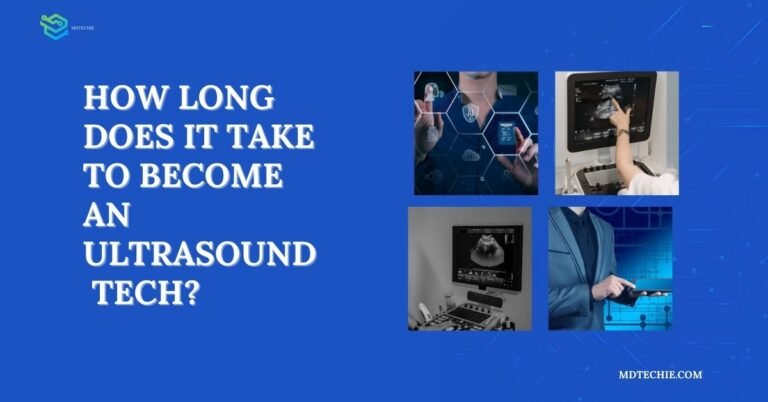How Long Does It Take to Become an Ultrasound Tech?
There’s a growing demand for ultrasound technicians in the medical field, and you may be wondering how long it will take to enter this rewarding profession. Your educational journey can vary significantly, depending on whether you choose a short certificate program or pursue an associate or bachelor’s degree.
This guide will help you understand the different pathways available, the time commitment required for each, and what to expect as you begin on your training to become an ultrasound technician.
Role and Responsibilities of an Ultrasound Technician

The role of an ultrasound technician is vital in the healthcare field, as you will operate imaging equipment to create visual representations of organs and tissues within the body.
These professionals work closely with patients, conducting ultrasound examinations that help physicians diagnose and monitor various medical conditions.
As you develop your skills, you’ll also play a key part in patient care, ensuring comfort and understanding throughout the imaging process.
Technician duties encompass a range of activities including preparing patients for exams, operating ultrasound equipment, analyzing images, and collaborating with other healthcare staff to provide comprehensive care. You’ll also be responsible for documenting patient information and maintaining equipment, ensuring quality and accuracy in your imaging results.
Educational Requirements and Clinical Experience
Definition of your role as an ultrasound technician hinges not only on practical skills but also on a solid educational foundation.
The quality of education and training you receive directly impacts your competency in performing ultrasound procedures and understanding the anatomy being examined.
Rigorous training helps you stay current with technological advancements and enhances your ability to work effectively in various clinical settings.
With the proper education and training, you will gain the necessary knowledge to operate complex ultrasound machines and correctly interpret the images produced. This specialized training is critical for ensuring that you can provide accurate assessments that aid in patient diagnosis and treatment.
By choosing a well-structured program, you’ll be equipped with both theoretical knowledge and hands-on experience, setting you up for success in this rewarding career.
The Role of Clinical Practicum

A necessary component of becoming an ultrasound technician is completing a clinical practicum. This hands-on, supervised training allows you to apply the knowledge gained during your studies in a real-world clinical setting, ensuring you are ready to work confidently in the field.
A clinical practicum typically involves direct patient interaction, allowing you to gain experience in patient care and mastering the use of ultrasound equipment.
This vital stage in your education not only enhances your technical skills but also helps you develop empathy and professionalism when dealing with patients, ultimately shaping you into a well-rounded ultrasound technician.
What to Study to Become an Ultrasound Tech
Now that you’ve decided to pursue a career as an ultrasound technician, it’s necessary to understand the educational requirements. The curriculum typically consists of a mix of theoretical and practical knowledge that equips you with the skills necessary for success in this field.
You can expect to encounter various subjects, including anatomy, patient care, and technology usage, ensuring you are well-prepared for your role.
Core Subjects in Ultrasound Technology
Any aspiring ultrasound tech should focus on core subjects such as human anatomy and physiology, ultrasound physics, and patient management. These foundational topics help you develop the expertise needed to perform ultrasounds accurately and interact effectively with patients, ultimately contributing to high-quality healthcare delivery.
Understanding Medical Terminology
Become proficient in medical terminology, as this will be integral to your day-to-day tasks. Familiarity with the language used in the medical field allows you to communicate effectively with colleagues and understand patient records and reports, which is crucial for providing accurate diagnoses.
Subjects in medical terminology cover a variety of topics, including prefixes, suffixes, and root words commonly used in healthcare. Mastering this vocabulary not only aids in building your confidence but also makes you a more effective member of the healthcare team. As an ultrasound tech, you’ll frequently encounter terms related to anatomy and procedures, making this knowledge vital for your role.
Types of Ultrasound Technician Programs and Their Duration
Keep in mind that the path you choose will significantly influence how long it takes to become an ultrasound technician. Here’s a quick overview of the main program types and their duration:
- Certificate Programs: Typically 1 year
- Associate Degree Programs: Generally 2 years
- Bachelor’s Degree Programs: Usually 4 years
- On-the-job Training: Varies, but often included in programs
- Specialization Courses: An additional few months to a year
Perceiving these options will help you determine which pathway aligns best with your career goals and timeline.
| Program Type | Duration |
| Certificate Programs | 1 year |
| Associate Degree Programs | 2 years |
| Bachelor’s Degree Programs | 4 years |
| On-the-job Training | Varies |
| Specialization Courses | Few months to a year |
Certificate Programs
Ultrasound technicians can pursue certificate programs that typically take about one year to complete. These programs focus on practical skills and basic ultrasound technology education, allowing you to quickly enter the workforce. Some institutions offer online or hybrid options to enhance flexibility.
Associate Degree Programs
Degree programs are often favored for creating a strong foundation in ultrasound technology. These typically require two years of study and include both classroom instruction and hands-on clinical experience. You’ll gain in-depth knowledge of anatomy, physiology, and various imaging techniques.
Length of study in an Associate Degree program is generally around 60 credits, covering crucial topics such as ultrasound physics and patient care. Many programs also incorporate supervised clinical hours, which are critical for gaining practical competencies and meeting certification requirements.
Bachelor’s Degree Programs
Pathways for advanced roles in ultrasound technology often led to pursuing a bachelor’s degree. This four-year program not only enhances your knowledge but also opens doors for leadership opportunities and specialized fields such as vascular and cardiac ultrasound.
Advanced training in a bachelor’s degree program typically includes comprehensive courses in advanced theoretical concepts and additional clinical experience, preparing you for higher-level certifications and career advancement in diverse healthcare settings.
Comparison of Different Programs
Despite varying educational pathways, all programs for becoming an ultrasound tech equip you with necessary skills.
Understanding your options is crucial to making an informed decision. Below is a comparison of different program types:
| Program Type | Time Commitment |
|---|---|
| Certificate Programs | 1-2 years |
| Associate Degree Programs | 2 years |
| Bachelor’s Degree Programs | 4 years |
Length of Study
One of the primary factors influencing your readiness to enter the field is the length of study you choose. Certificate programs typically take around one to two years to complete, whereas associate degree programs require about two years.
For those aiming for a deeper educational foundation, bachelor’s degree programs will demand a four-year commitment. Your choice will hinge on your career goals and how quickly you want to start working.
Cost of Education
Education costs can vary significantly depending on the program you select. Certificate programs tend to be less expensive, averaging around $5,000 to $15,000, while associate degree programs can range from $10,000 to $30,000. Bachelor’s degree programs often require a more substantial financial investment, with costs starting at around $20,000 and potentially reaching $50,000 or more. Assessing the return on investment is necessary for your financial planning.
Programs at community colleges are generally more affordable than those at universities, which can help you make a decision based on your budget and career ambitions. Many institutions offer financial aid options, so be sure to explore scholarships and grants that may be available to you. Consider not just tuition but also additional expenses, such as books and materials, to better prepare for your financial commitment.
Career Prospects and Benefits

One of the most appealing aspects of becoming an ultrasound tech is the potential salary and job opportunities available to you.
Entry-level positions typically start around $50,000 annually, with experienced professionals earning upwards of $75,000 or more, depending on location and specialization.
The demand for skilled ultrasound technicians continues to grow, promising a stable career with promising prospects.
This field is expected to expand significantly in the coming years, driven by an aging population and advances in imaging technology. By choosing a program that aligns with your goals, you can position yourself for a rewarding with ample job opportunities across various healthcare settings, including hospitals, clinics, and private practices.
Career Satisfaction and Job Outlook
Many ultrasound technicians report high levels of job satisfaction due to the rewarding nature of their work and the positive impact they have on patients’ lives. With a strong demand for skilled professionals in the medical imaging field, you can expect a promising job outlook, as the Bureau of Labor Statistics indicates a substantial growth rate for this profession in the coming years.
Work-Life Balance for Ultrasound Technicians
An important factor for you to consider is the work-life balance commonly experienced by ultrasound technicians. Many positions offer flexible schedules, with some professionals working part-time or various shifts, allowing you to maintain a balance between your personal and professional life.
Job Security and Growth Projections
Ultrasound technicians enjoy strong job security, as the growing healthcare industry is consistently in need of qualified imaging professionals. With advancements in technology and an increasing aging population, the demand for ultrasound services is expected to rise significantly, creating promising job opportunities.
Satisfaction with job security stems from projected growth rates for ultrasound technicians. The Bureau of Labor Statistics anticipates a growth rate of around 12% for diagnostic medical sonographers over the next decade, which is much faster than the average for all occupations. This surge indicates that your prospects in the field will remain robust, offering both stability and career advancement opportunities.
Testimonials from Current Professionals
Testimonials from current professionals highlight the rewarding aspects of a career as an ultrasound technician. Many of your peers express their fulfillment in diagnosing conditions and helping patients, citing it as an integral part of why they chose this path.
Projections from professionals in the field emphasize a strong sense of community and support among ultrasound technicians. Many share experiences of collaboration and teamwork, which not only enhance job satisfaction but also foster a positive workplace culture. As you begin on this career, you can look forward to being part of a profession that values empathy and excellence in patient care.
Factors That Can Affect the Length of Schooling

All students pursuing a career as an ultrasound technician may encounter various factors that can influence the duration of their education. Understanding these factors can help you make informed decisions about your career path:
- Your chosen educational pathway (certificate, associate, or bachelor’s degree)
- Previous work or academic experience in the medical field
- Full-time vs. part-time study options
- Program referral and location specifics
Perceiving these elements will aid you in effectively planning your journey to becoming an ultrasound technician.
Previous Education and Experience
Previous education and experience can significantly impact your time in school. If you already hold a degree in a related field or have relevant medical training, you may qualify for advanced placement in ultrasound programs, condensing your overall schooling period. This prior knowledge can also enhance your understanding of course material, potentially leading to a quicker path to certification.
Full-Time vs. Part-Time Study
Schooling as an ultrasound technician can vary considerably based on whether you choose a full-time or part-time study schedule. Full-time programs typically require a greater time commitment, often allowing for the completion of coursework in a shorter duration. On the other hand, part-time options offer flexibility, enabling you to balance work and family responsibilities, but may extend your total time in the program.
Education is tailored to suit your lifestyle and needs, allowing you to select the pace that fits your situation best. While full-time programs may take around two years for an associate degree and three to four years for a bachelor’s degree, part-time study may require additional semesters to reach completion. Be sure to evaluate your current commitments when making this decision.
Accreditation and Program Requirements
Education programs for ultrasound technicians vary in their accreditation and specific requirements, which can also alter your length of schooling. Organizations that provide accreditation help ensure the program curriculum meets industry standards, which is crucial for your future employment.
Programs with stringent entry requirements or additional pre-requisites may extend your educational timeline, depending on your background and previous qualifications.
Requirements for accredited ultrasound technology programs can include a mix of coursework, clinical experience, and hands-on training. This may dictate your overall experience and time in the field. Ensuring that you enroll in a program with proper accreditation will ultimately influence not just your schooling duration, but also your future job prospects and career growth, emphasizing the importance of making an informed choice.
Financial Considerations for Ultrasound Tech School

Your financial planning is important when pursuing a career as an ultrasound technician. The costs of education, from tuition to equipment, can vary significantly depending on the program you choose, so it’s important to evaluate your resources and options carefully to ensure that you make informed decisions about your future in this rewarding field.
The cost of tuition for ultrasound technician programs can range widely. Certificate programs typically cost less—often under $10,000—while associate degree programs may range from $10,000 to $30,000. Bachelor’s degree programs generally exceed $30,000, so you should carefully assess your budget and choose a pathway that aligns with your financial situation.
Financial Aid and Scholarships
Any aspiring ultrasound technician should explore financial aid options and scholarships available to them. Many schools offer financial assistance, grants, and scholarships specifically for health science students. Federal financial aid, such as Pell Grants and student loans, may also help you fund your education.
Costs associated with ultrasound technician programs can be daunting, but numerous resources can assist you. Research state and federal financial aid programs, as well as private scholarships.
Some hospitals and healthcare facilities provide tuition reimbursement for workers in need of advanced training, making it crucial to examine all potential avenues for support while pursuing your education.
Return on Investment
The return on investment (ROI) for becoming an ultrasound technician is generally favorable. With entry-level salaries averaging between $60,000 and $70,000 annually, you can expect to recover your educational expenses relatively quickly, especially when considering the increasing demand for healthcare professionals in the sector.
For instance, if you invest $20,000 in a two-year associate degree program and secure a job earning $65,000 annually, your ROI is substantial. In just over three years, you could recover your education costs, positioning yourself in a stable field with potential for career advancement, contributing to an ongoing upward trajectory in your earnings.
Job Search and Networking Strategies

Keep in mind that job placement and internship opportunities are vital components of becoming an ultrasound technician. Many programs offer clinical placements as part of their curriculum, allowing you to gain real-world experience and make valuable connections in the healthcare industry.
This hands-on training not only enhances your skill set but also significantly boosts your employability upon graduation.
An important aspect of securing a position as an ultrasound technician is the relationship between employers and educational institutions. Many healthcare facilities actively collaborate with schools to provide students with internship opportunities and job placements upon graduation. These connections can give you a competitive edge in the job market.
This collaboration ensures that the curriculum aligns with the current needs of employers, providing you with the skills and knowledge they seek. Engaging with faculty who have established ties to local healthcare providers can help you access exclusive job opportunities and recommendations, further enhancing your chances of entering the workforce smoothly after training.
Importance of Clinical Experience
Clinical experience is crucial for aspiring ultrasound technicians. It provides you with practical skills, allowing you to apply theoretical knowledge in a clinical setting. This exposure is vital for mastering ultrasound techniques, understanding patient care, and developing confidence in your abilities before entering the workforce.
Networking and Job Search Strategies
On your journey to becoming an ultrasound technician, effective networking and job search strategies will play a critical role in your success. Engaging with professionals in the field through internships, workshops, and job fairs can open doors to job opportunities and provide insights that help you navigate the hiring process.
Strategies for networking include joining professional organizations, attending industry conferences, and utilizing online platforms like LinkedIn to connect with fellow ultrasound techs and employers. Consider creating a compelling resume highlighting your clinical experience and relevant skills.
Additionally, leveraging your school’s career services can help you find job openings and prepare for interviews, setting you up for success in your job search.
Career Advancement and Specializations

Unlike some other fields in healthcare, becoming an ultrasound technician opens the door to various advanced career opportunities. You can expand your expertise and enhance your earning potential through additional training and specialization. Consider the following:
- Specializations in cardiac, vascular, or obstetric ultrasound
- Leadership roles in healthcare facilities
- Educational opportunities as an instructor or trainer
- Research positions in ultrasound technology
| Career Path | Description |
|---|---|
| Cardiac Sonographer | Focus on imaging the heart and blood vessels. |
| Vascular Technologist | Concentrate on blood flow and related disorders. |
| Diagnostic Medical Sonographer | Broad imaging skills across various medical areas. |
With advancements in ultrasound technology, there are numerous specializations available to you within the field. These specializations often come with additional training and certification, allowing you to focus on specific areas such as cardiac, vascular, or obstetric ultrasound, ultimately enhancing your career prospects and professional growth.
Leadership and Management Roles

On your journey in ultrasound technology, you may aspire to take on leadership and management roles that allow you to oversee teams, manage departments, or direct ultrasound programs.
These positions often require additional training in management and leadership principles, but they can significantly expand your responsibilities and rewards.
To successfully transition into leadership positions, you should consider obtaining a degree in healthcare administration or a related field. Experience and skills in communication, problem-solving, and team management will also be pivotal as you lead a team of ultrasound technicians and collaborate with other healthcare professionals to ensure quality patient care and efficient workflow in your department.
Continuing Education and Professional Development

To stay current and competitive in the field of ultrasound technology, you must commit to ongoing education and professional development.
This can involve attending workshops, obtaining additional certifications, or participating in conferences related to advancements in ultrasound technology and techniques.
Specializations are increasingly valued in the healthcare job market, and many employers prioritize candidates with advanced certifications. Engaging in continuing education not only enhances your skills but also demonstrates your dedication to your profession, potentially opening doors for advancement opportunities and new career paths within the ultrasound technology field.
The Impact of Technology on Ultrasound Careers

After beginning on a journey to become an ultrasound technician, you’ll quickly discover that technology plays a vital role in shaping your career.
Advancements in imaging equipment and techniques not only enhance the accuracy and efficiency of diagnoses but also create new opportunities for ultrasound professionals.
Staying updated with technological trends is crucial, as these innovations often dictate the tools and methodologies you will use in your daily work, directly impacting your skill set and career progression.
Emerging Technologies in Imaging
For those entering the field of ultrasound technology, understanding the latest imaging technologies is crucial. Innovations such as 3D and 4D ultrasound, artificial intelligence, and advanced imaging software are redefining diagnostic capabilities.
These tools not only improve image quality and diagnostic accuracy but also expand the range of services you can offer, making you a more valuable asset in the healthcare environment.
The Role of Telehealth in Ultrasound
Telehealth has transformed the way you approach patient care as an ultrasound technician. By integrating remote technology, you can provide services to patients who may have difficulty accessing traditional healthcare facilities. This shift has increased the demand for professionals skilled in both ultrasound techniques and telehealth systems, broadening your job prospects in the medical field.
Ultrasound technology enables you to perform vital assessments remotely, increasing accessibility for patients while also fostering a more flexible work environment. Whether conducting virtual consultations or transmitting imaging results to physicians, telehealth streamlines communication and improves patient outcomes.
As remote healthcare services become more prevalent, your ability to navigate these systems will be a crucial component of your role as an ultrasound technician.
Adjusting to Technological Advancements
Careers in ultrasound technology require you to be adaptable to ongoing technological advancements. As new tools and techniques emerge, your willingness to embrace change and continually update your skills will determine your success in the field. Maintaining a growth mindset is vital, as it allows you to stay competitive in a rapidly evolving healthcare landscape.
Imaging technology is constantly evolving, influenced by factors such as research developments and patient needs. By engaging in continuing education and professional development, you can ensure that you remain proficient with the latest advancements.
This not only enhances your competency as an ultrasound technician but also opens doors for career advancement in specialized areas, ultimately shaping your future in the medical field.
Geographic Considerations for Employment

Not all regions offer the same opportunities for ultrasound technicians. Your location can greatly influence job availability, earning potential, and career advancement.
Urban areas often have a higher demand for healthcare services, which can lead to more available positions for ultrasound techs, while rural locations may offer fewer options.
Being aware of these geographic factors is vital in making informed decisions about your future in this rewarding field.
Impact of Local Healthcare Systems
One factor you should consider is the impact of local healthcare systems. In regions with well-established hospitals and clinics, there are likely more job opportunities for ultrasound technicians. These facilities not only require ultrasound services but may also provide specialized training and career advancement options, enhancing your overall job prospects.
To maximize your employment chances, it’s pivotal to research local healthcare systems and their infrastructure. Strong healthcare systems tend to invest in advanced imaging technologies and hire more techs, resulting in a thriving job market.
On the other hand, areas with limited resources may not have the same demand for ultrasound services, which can affect your potential job opportunities in that region.
Moving for Job Opportunities
Systems sometimes dictate whether you need to consider moving for better job opportunities in the ultrasound field. If you find that your local market is saturated or lacking, relocating to a region with higher demand can be beneficial for your career. Understanding regional job markets can allow you to make strategic decisions about your employment.
This approach can significantly impact your career growth and earning potential as an ultrasound technician. By moving to a location with a thriving healthcare system, you may not only find more job openings but also take advantage of higher salaries and advanced training programs. Ultimately, being proactive about your geographic options can lead to a more fulfilling and prosperous career in ultrasound technology.
To wrap up
Taking this into account, the time it takes to become an ultrasound technician can vary significantly based on your chosen educational path. You can complete a certificate program in as little as one year, while obtaining an associate degree typically takes two years or more.
If you aspire to pursue advanced roles, a bachelor’s degree may require four years. Therefore, understanding your goals and the time commitment required is imperative in planning your journey to become a skilled ultrasound technician.

Daniel E
Hey there! I’m Daniel E, your friendly tech guide. At MD Techie, I unravel tricky tech stuff, making it easy-peasy for both newbies and seasoned pros. Think of me as your decoder ring for all things geeky!” 🌟🔍🚀


